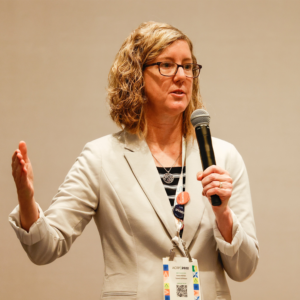If it isn’t exactly a kinder, gentler future for clinical research professionals that certain speakers at ACRP 2022 saw in their crystal balls this morning (April 24), it is at least a more thoughtful, honest, and better connected one they are looking forward to.
Presenting on the theme of “CRA Manager Role as in Inquiring Leader,” Mary Lord, RN, MS, CCRA, a clinical research associate (CRA) manager at Merck, said that CRAs and CRA managers have the same goals where monitoring of study sites is concerned—clean data and safe patients. For the CRA manager, however, these goals are reached through their attentive management and training of, open communication with, and rigorous oversight of the CRAs under their watch, she noted.
Citing the popular sentiment that “people don’t leave organizations, they leave managers,” Lord advocated for CRA managers to follow the tenets of “servant leadership,” which can be instilled even in organizations dominated by top-down leadership if “you go to work every day with a mission” in mind.
“We want people to do what they love” in clinical research, said Lord, whose session was supported by an educational grant from the Bracane Company. “When they come to work, we want them to be happy.” Still, she adds, being a CRA manager means communicating honestly with CRAs about their responsibilities, performance goals, and work habits by providing them with frequent feedback, recognition, and time to vent frustrations, when needed.
Approaching her prognostications from a more technology-driven angle, Bree Burks, RN, MSN, vice present of strategy in Site Solutions for Veeva Systems, spoke about the importance of certain disruptive innovations now occurring—and others perhaps soon to come—in clinical research. By and large, she sees these innovations tackling the enterprise’s main challenges of too many technology systems being used in too many settings, repetitive data entry still being a big issue, integrations of systems being treated as the main option for improvements when other tactics may be more fruitful, and the concept of patient centricity receiving “lots of talk, but little action.”
“Maybe there are some things going on right now that are making for a poor experience [for stakeholders] in our market and we aren’t even aware of them,” Burks warned. Disruptive innovation occurs, she said, when an innovator tackles a niche segment of a market with a better approach to a newly detected shortcoming and is slowly able to build upon it to the point of eventually taking over the market as they are perceived to be providing a better experience for the customer.
Burks said an example of this in clinical research is how various companies are trying to integrate more aspects of electronic health records into new products that could compete with currently dominant providers in that arena such as Epic, Cerner, and Meditech.
As for the popular notion that patients will become more and more like consumers in clinical trials, Burks said “I don’t think we’re going to fully get there…until we have fully digital” systems that can seamlessly handle information exchanges between study sites, sponsors, and patients.
Author: Gary Cramer



